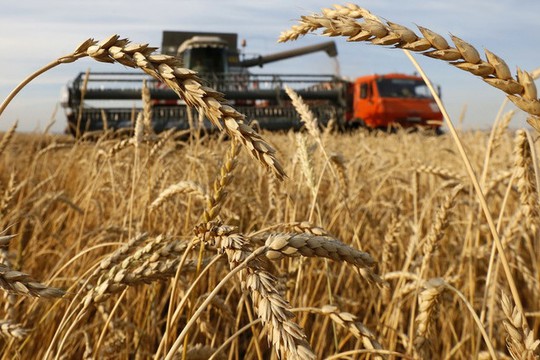Since the beginning of the military conflict between Moscow and Kyiv, the cost of wheat has been constantly changing, writes French ‘L’opinion’.
Between February and May 2022, when Ukrainian grains were blocked, prices for these products on the Euronext exchange soared from 180 to 430 euros per ton. The prospect of opening a safe corridor, which was decided by the warring parties under the auspices of the international community, somewhat weakened their growth – up to 350 euros in July. After that, the cost fell and in recent months fluctuated between 230-240 euros per ton.
Moscow has said that the corridor closed on July 17 will not be opened again. This is due to the fact that it did not get the international community to resume the export of Russian fertilizers and connect its agricultural bank to the international SWIFT system. But the news did not cause hype in the markets. On Wednesday, August 9, wheat on Euronext was sold at 240 euros per ton, more expensive than before the start of the conflict, but this is no longer the peak.
Why wheat prices reacted so poorly to messages that used to take them to cosmic levels? This year the product supply is quite large.
“Russia is expected to harvest 85 million tons of wheat, – explains Arthur Portier, grain market expert at Agritel. – Last year, this figure was 95 million tons, while 20 million remained in reserves. This year, Russia can export about 47 million tons, which makes it the largest supplier in the world. There is no lack of volume.”
Does this mean, however, that all is well, that the availability of cereals is no longer a global problem, and that the possibility of famine is over? – “To think so would be a big mistake, – says Arthur Portier. – We are hanging on by a thread.”
Thierry Pouch, Chief Economist at the Chamber of Agriculture, says: “Last year, many countries were forced to buy wheat at extremely high prices. This drained their budgets and undermined their ability to buy wheat at high prices. It increased in the cost of imports also.
Lebanon, for example, is in a critical situation after the explosion of a storage facility in the port of Beirut in 2020, and the situation is only getting worse. Tunisia is also in a rather difficult situation, which aggravated by the fact that this country, plunged into a financial crisis, refused an IMF loan.
“The problem of hunger still exists, – concludes Thierry Pouch. – Armed conflicts are multiplying. Climate disasters follow one after another, forcing powers like India to limit the volume of exports of rice, sugar and wheat. These are not so large scale, but they increase food tensions. An El Niño expected in November will exacerbate the situation.”
At the Russia-Africa summit held in St. Petersburg at the end of July, the countries of the Black Continent were clearly concerned about the problem of direct access to food. Moscow assured them that Russia would provide what was lacking, as was the case with Egypt. Russia will also provide a financial assistance, as promised to Zimbabwe. In quantitative terms, this is negligible, but diplomatically it is very important. Moreover, Vladimir Putin can accuse the West of closing the corridor that worries his African colleagues so much.
This is the key to unraveling everything that is happening. In the current situation, Moscow, with its huge grain reserves, has a very powerful “weapon” at its disposal. “The Russian plan to attract other states to its side through food supplies has justified itself,” Thierry Pouch sums up.
Europe, in turn, is doomed to watch the weakening of its influence in the grain markets. “With the cost of its production $50 per ton higher than that of Russian Black Sea wheat, France cannot compete with them. Our offers in Egypt are $25 more expensive than Russian ones. In Algeria — $18 more. Previously the priority was given to French wheat, now this is not the case. We have lost economic distribution channels, but above all we have lost diplomatic influence. We have lost our usual buyers to Russia. Nobody takes into account this state of affairs, and this is a tragedy,” Arthur Portier admits with sadness.
The global balance of power around wheat plays out at every harvest. This year, it is clear that Moscow has taken the lead.
…There are two important additions to this information.
First, Russia will be able to export 55 million tons of wheat this year (15% share in the grain market) at a price of $240-250 per ton, ahead of all world leaders – Australia, USA, Canada.
Second, from November 1, 2023, Russia will begin to export agricultural products only for rubles; this scheme completely repeats the rules under which Russia trades gas with the European Union, and aimed to protect grain exports from Western sanctions.
read more in our Telegram-channel https://t.me/The_International_Affairs

 11:31 28.08.2023 •
11:31 28.08.2023 •























